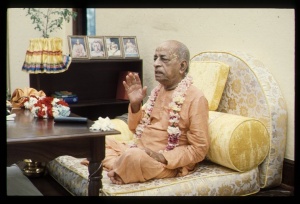CC Antya 1.144: Difference between revisions
m (1 revision(s)) |
No edit summary |
||
| Line 1: | Line 1: | ||
{{ | [[Category:Sri Caitanya-caritamrta - Antya-lila Chapter 01|C144]] | ||
<div style="float:left">'''[[Sri Caitanya-caritamrta|Śrī Caitanya-caritāmṛta]] - [[CC Antya|Antya-līlā]] - [[CC Antya 1|Chapter 1: Śrīla Rūpa Gosvāmī's Second Meeting With the Lord]]'''</div> | |||
<div style="float:right">[[File:Go-previous.png|link=CC Antya 1.143|Antya-līlā 1.143]] '''[[CC Antya 1.143|Antya-līlā 1.143]] - [[CC Antya 1.145|Antya-līlā 1.145]]''' [[File:Go-next.png|link=CC Antya 1.145|Antya-līlā 1.145]]</div> | |||
{{CompareVersions|CC|Antya 1.144|CC 1975|CC 1996}} | |||
{{RandomImage}} | |||
==== TEXT 144 ==== | ==== TEXT 144 ==== | ||
<div class="verse"> | |||
<div | :dhari-a paḍicchanda-guṇaṁ | ||
dhari-a paḍicchanda-guṇaṁ | :sundara maha mandire tumaṁ vasasi | ||
sundara maha mandire tumaṁ vasasi | :taha taha rundhasi bali-aṁ | ||
taha taha rundhasi bali-aṁ | :jaha jaha ca-idā palāemhi | ||
jaha jaha ca-idā palāemhi | |||
</div> | </div> | ||
| Line 15: | Line 18: | ||
==== SYNONYMS ==== | ==== SYNONYMS ==== | ||
<div class="synonyms"> | |||
<div | ''dhari-a''—capturing; ''paḍicchanda-guṇam''—the quality of an artistic picture; ''sundara''—O most beautiful one; ''maha''—My; ''mandire''—within the heart; ''tumam''—You; ''vasasi''—reside; ''taha taha''—that much; ''rundhasi''—You block; ''bali-am''—by force; ''jaha jaha''—as much as; ''ca-idā''—being disturbed; ''palāemhi''—I try to escape. | ||
dhari- | |||
</div> | </div> | ||
| Line 23: | Line 25: | ||
==== TRANSLATION ==== | ==== TRANSLATION ==== | ||
<div class="translation"> | |||
<div | " 'O dearly beautiful one, the artistic loveliness of Your picture is now impressed within My mind. Since You are now living within My mind, wherever I wish to run because I am agitated by impressions of You, I find that You, O My friend, are blocking My way." ' | ||
</div> | </div> | ||
| Line 31: | Line 32: | ||
==== PURPORT ==== | ==== PURPORT ==== | ||
<div class="purport"> | |||
<div | This verse (''Vidagdha-mādhava'' 2.33) is written in the Prakrit language, not in Sanskrit. When transformed into Sanskrit, it reads as follows: | ||
This verse (Vidagdha-mādhava 2.33) is written in the Prakrit language, not in Sanskrit. When transformed into Sanskrit, it reads as follows: | |||
:dhṛtvā praticchanda-guṇaṁ sundara mama mandire tvaṁ vasasi | :''dhṛtvā praticchanda-guṇaṁ sundara mama mandire tvaṁ vasasi'' | ||
:tathā tathā ruṇatsi balitaṁ yathā yathā cakitā palāye | :''tathā tathā ruṇatsi balitaṁ yathā yathā cakitā palāye'' | ||
The meaning is the same, but the native language is different. It was spoken to Kṛṣṇa by Madhumaṅgala as he read Him a letter from Śrīmatī Rādhārāṇī. | The meaning is the same, but the native language is different. It was spoken to Kṛṣṇa by Madhumaṅgala as he read Him a letter from Śrīmatī Rādhārāṇī. | ||
</div> | </div> | ||
__NOTOC__ | |||
<div style="float:right; clear:both;">[[File:Go-previous.png|link=CC Antya 1.143|Antya-līlā 1.143]] '''[[CC Antya 1.143|Antya-līlā 1.143]] - [[CC Antya 1.145|Antya-līlā 1.145]]''' [[File:Go-next.png|link=CC Antya 1.145|Antya-līlā 1.145]]</div> | |||
__NOTOC__ | |||
__NOEDITSECTION__ | |||
Revision as of 12:28, 11 September 2021

A.C. Bhaktivedanta Swami Prabhupada
TEXT 144
- dhari-a paḍicchanda-guṇaṁ
- sundara maha mandire tumaṁ vasasi
- taha taha rundhasi bali-aṁ
- jaha jaha ca-idā palāemhi
SYNONYMS
dhari-a—capturing; paḍicchanda-guṇam—the quality of an artistic picture; sundara—O most beautiful one; maha—My; mandire—within the heart; tumam—You; vasasi—reside; taha taha—that much; rundhasi—You block; bali-am—by force; jaha jaha—as much as; ca-idā—being disturbed; palāemhi—I try to escape.
TRANSLATION
" 'O dearly beautiful one, the artistic loveliness of Your picture is now impressed within My mind. Since You are now living within My mind, wherever I wish to run because I am agitated by impressions of You, I find that You, O My friend, are blocking My way." '
PURPORT
This verse (Vidagdha-mādhava 2.33) is written in the Prakrit language, not in Sanskrit. When transformed into Sanskrit, it reads as follows:
- dhṛtvā praticchanda-guṇaṁ sundara mama mandire tvaṁ vasasi
- tathā tathā ruṇatsi balitaṁ yathā yathā cakitā palāye
The meaning is the same, but the native language is different. It was spoken to Kṛṣṇa by Madhumaṅgala as he read Him a letter from Śrīmatī Rādhārāṇī.